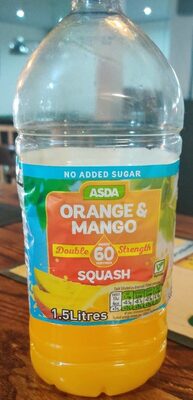
Barcode: 5054781377535
Orange and Mango Squash
HALAL
📝 Reason: After a detailed ingredient check, almost all listed components in Orange and Mango Squash are Halal or very likely Halal, except for ‘flavourings’, which is ‘Doubtful’ due to unspecified origin (possible alcohol or animal components). In Islamic dietary law, products with doubtful ingredients are considered ‘Doubtful’ (Quran 5:3 and IFANCA guidance). If any ingredient is marked Doubtful, the entire product is Doubtful. See also www.ifanca.org for more on Halal certification and processing.
🏷️ Category: Plant Based Foods And Beverages, Plant Based Foods, Pumpkin And Squash Plant Products, Squash
📄 Certificates: No Added Sugar, Vegetarisch, Vegan
Ingredients:
Details
Understanding the Halal Status of Orange and Mango Squash
The Orange and Mango Squash is a refreshing beverage that has captured the taste buds of many. However, for those who observe halal dietary laws, a critical question arises: Is this product halal? After a thorough examination of its ingredients, the answer is yes, with a particular note on certain components.
What Makes a Product Halal?
In Islamic dietary law, halal refers to what is permissible. This classification extends to food and beverages, determining what can be consumed. Ingredients that are free from any haram (forbidden) elements are considered halal. It is important to note that, while most ingredients in the Orange and Mango Squash are halal, there are one or two components that raise questions.
Halal Status of Ingredients
The ingredients list of the Orange and Mango Squash includes the following:
- Water: Pure water is halal and not questionable.
- Comminuted orange from concentrate (15%): This component, derived from oranges, is fully halal.
- Mango puree from concentrate (3%): The mango content is made from halally sourced fruit.
- Citric acid: Generally derived from citrus fruits or fermentation, this acid is halal unless sourced from haram origins, which is not indicated here.
- Acidity regulator (sodium citrates): These salts are natural derivatives of citric acid and halal.
- Mic act: If this refers to Microcrystalline cellulose, it is halal.
- Sweeteners (acesulfame K, sucralose): Both of these artificial sweeteners are halal.
- Flavourings: This component is marked doubtful due to unspecified origin, as it may contain animal-derived or alcohol influences.
- Preservatives (potassium sorbate, sodium metabisulphite): Both of these are confirmed halal.
- Stabilizer (carboxy methyl cellulose): Generally plant-derived and halal unless from a haram source.
- Antioxidant (ascorbic acid): Vitamin C is halal and synthesized via a halal process.
- Colour (carotenes): Since these colorants are derived from plants, they are halal.
The Doubtful Ingredient: Flavourings
While most ingredients in the Orange and Mango Squash are halal, ‘flavourings’ pose a question mark. This term can encompass both natural and artificial sources, and without clear labeling, the origins may not be explicitly known. Additionally, some flavourings may include alcohol or substances derived from animals, which are not permissible in a halal diet. Hence, due to the general ambiguity around flavourings, this component is labeled as doubtful.
Understanding ‘Doubtful’ Ingredients
In accordance with Islamic dietary laws, any ingredient categorized as doubtful can result in the whole product being considered doubtful as well. This principle stems from Quranic guidelines (Quran 5:3) and is reinforced by organizations like IFANCA. Consumers are advised to approach such products with caution.
Brand and Certification Context
The Orange and Mango Squash belongs to a well-recognized category of plant-based foods and beverages, specifically focusing on squash products. While the product does not bear a specific halal certification, many brands in this sector align their production methods with halal standards to appeal to a broader audience. Furthermore, this product boasts several certifications including ‘No Added Sugar’, ‘Vegetarisch’, and ‘Vegan’, reassuring health-conscious consumers of its quality.
Final Verdict
In conclusion, the Orange and Mango Squash is primarily halal, but the uncertain status of the flavourings needs to be considered. For strict observers of halal laws, further research or consultation with the manufacturer regarding this specific ingredient may be worthwhile. Always remember to check for halal certification and investigate ingredient sources to ensure adherence to your dietary requirements.
